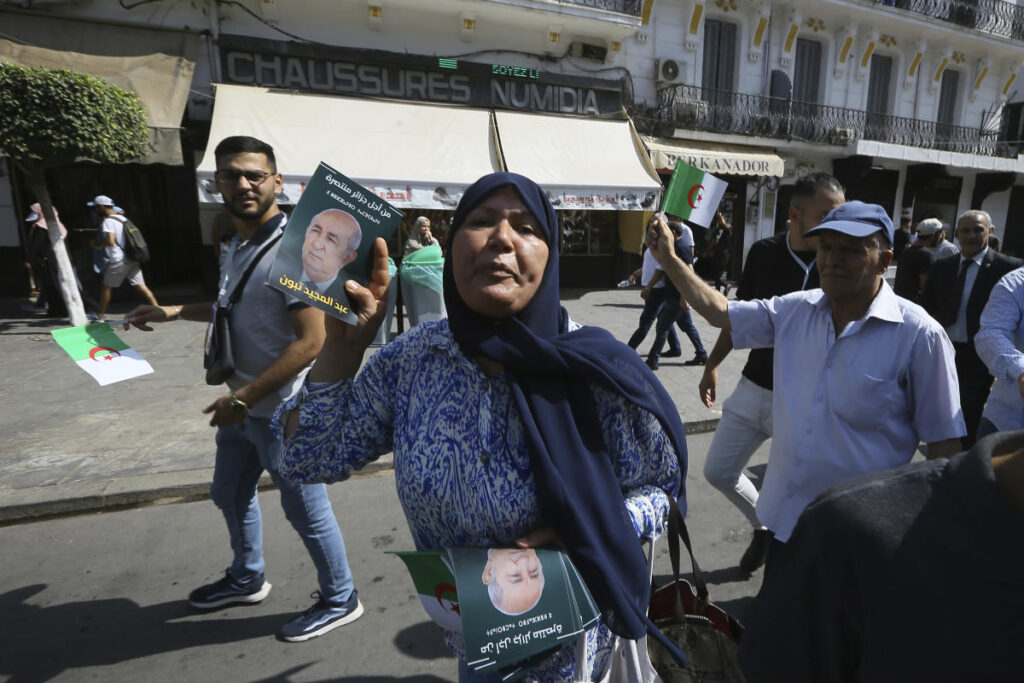ALGIERS, Algeria (AP) — Algerians go to the polls Saturday to cast their votes for president and determine who will rule their gas-rich North African country, five years after pro-democracy protests prompted the military to oust the previous president after two decades in power.
Algeria is the largest country in Africa by area and with almost 45 million people it is the second most populous country on the continent after South Africa to hold presidential elections in 2024 – a year in which more than 50 elections are held all over the world and involve more than half of the world’s population.
Since elections were planned in march — ahead of the predicted schedule — there was little tension when military-backed President Abdelmadjid Tebboune seems ready to take victory easily against the two opponents: an Islamist and a leftist.
The hot summer campaign has generated little enthusiasm, except on public television, where it is imperative that candidates and surrogates be defeated. On television, the election season is presented as a lively affair.
“Voting in Algeria has no meaning, just like in the big democracies,” Kaci Taher, 28, told The Associated Press a month before the election. “Where I come from, the results and quotas are predetermined in the back room of the government, so what’s the point of participating in the electoral farce?”
“Uncle Tebboune”, as his campaign describes the 78-year-old, was elected in December 2019 After nearly a year of weekly demonstrations demanding the resignation of former President Abdelaziz BouteflikaTheir demands were met when Bouteflika resigned in April and was replaced by an interim government of his former allies, which called elections later that year.
Protesters against holding elections too earlyfearing that the candidates running that year were all close to the old regime and would perpetuate the corruption-ridden system they sought to end. Tebboune, a former prime minister seen as close to Algeria’s politically powerful military, emerged victorious. But his victory was marred by low voter turnout, widespread boycotts by protesters and turmoil on election day, with crowds ransacking polling stations and police breaking up demonstrations.
This year, Tebboune participated as an independent candidate with the support of several political parties, including the Front de Liberation Nationale, which has dominated Algerian politics since the country gained independence from France in 1962 after more than a decade of war.
The native of southwestern Algeria and a political veteran has seen his first term as a turning point. He told voters at a campaign rally the week before the election that he had “put Algeria back on track.” To cement his legitimacy, both domestically and among Algeria’s allies, he hopes that more of the country’s 24 million eligible voters will participate in Saturday’s election than did in his first, when 39.9 percent turned out.
“It seems that what ‘le pouvoir’ considers most important in these elections is turnout to give legitimacy to their candidate, whose victory is a foregone conclusion,” said Algerian sociologist Mohamed Hennad, using a term often used to describe the military-backed political establishment.
Twenty-six candidates filed preliminary papers to run in the election, though only two were ultimately approved to challenge Tebboune. Like the president, both have also emphasized turnout. They are not political novices and have avoided directly criticizing Tebboune during the campaign.
Abdelali Hassani Cherif, a 57-year-old engineer from the Islamist Movement of Society for Peace party, has populist appeals to the Algerian youthwith the slogan “Opportunities!” and a call for efforts to boost employment and reform education, French In addition to Arabic, language has long played an important role.
Youcef Aouchiche, a 41-year-old former journalist running with the Socialist Forces Front, campaigned on a “vision for tomorrow” and cited human rights issues plaguing journalists, activists and government critics in Tebboune’s Algeria. It is the first time since 1999 that his party, which enjoys strong support among ethnic minorities in central Algeria, has fielded a candidate.
Andrew Farrand, Middle East and North Africa director at geopolitical risk consultancy Horizon Engage, said both opposition candidates were more focused on the 2025 parliamentary elections than the 2024 presidential election. Because Algerian law funds political parties based on the number of seats they win in parliamentary elections, they hope that campaigning will allow them to perform strongly in 2025.
“It’s a long-term game: How can I mobilize my base? How can I build a campaign machine? And how can I curry favor with the authorities so that I’m in a position to increase my seats?” he said. “We saw that in their choice not to openly criticize the president … coupled with a very strong message to Algerians to go out and vote.”
Besides Aouchiche and Cherif there were others boycotted the match and condemned it as a kind of rubber stamping exercise that could only strengthen the power of Tebboune and the elite that governs the country.

